Crate Training & Mental Health
- Kristi MacLeod
- Nov 1, 2022
- 3 min read
Crate training has become a taboo subject among some dog trainers and dog owners. There is a misconception that we lock dogs in small cages and only let them out when its convenient for us. That in itself couldn't be farther from the truth and there are a multitude of reasons why a puppy, or adult dog should be able to relax and rest in a crate including, but not limited to: safety, providing a quiet place to sleep, in the event your dog has to take a plane ride, or has to stay overnight at the vet, if you're transporting your dog in a vehicle etc... This list goes on and on.
But have you ever considered that crate training your dog could have a positive impact on their mental health❓❓
Dogs needs sleep and on average, dogs can sleep 12-14 hours a day while senior dogs and puppies can sleep 18-20 hours a day.
When we talk about sleep, we are talking about uninterrupted sleep in a quiet place.
➡️ Many dogs who do not have a crate to sleep in, are expected to sleep in high traffic areas of the home. These dogs are constantly interrupted by the hustle and bustle of daily life in the house, by the TV volume, kids running around and playing etc. The end result of this, is a dog who is not getting the appropriate amount of deep, restful sleep.
What happens in the brain when humans don't get enough sleep❓❓
🚫Lack of sleep in the human brain triggers an increased production of cortisol which is directly linked to stress. The more cortisol in our bodies, the more stressed out we feel.
🚫 Some people experience an "anxiety bloom" in the morning before the day has even begun, creating a cycle of anxiety and sleep loss.
🚫 Lack of sleep also effects our amygdala. Our "fight or flight" response becomes highly aroused when we haven't slept enough.
🚫 One particular study found that, "brains of participants who'd experienced even brief periods of sleep deprivation showed greater activity in a complex of "emotion generating regions of the brain" and reduced activity in "emotion regulating regions.""
Anecdotal evidence suggests that a lack of sleep in dogs closely mimics that of humans❗ This can include:
➡️ More intense reactions to stimuli
➡️Irritability and mood disturbances
➡️Poor memory
➡️One study has also shown that sleep is an integral part of a dog's ability to learn. The study found that, "dogs who slept well after learning a new command performed better when tested a week later than dogs who did not."
So, what this means is that a lack of sleep can actually trigger and worsen reactivity in dogs❗❗
Here are some tips to help your dog sleep better:
✅Set a schedule - Keeping a regular schedule may help your dog rest better.
✅Sleep alone - Many people enjoy sleeping with their dogs in their bed, but this can cause disrupted sleep patterns for both the human and the dog. Oftentimes, these disruptions occur without us even realizing it, so you may not even be aware that your dog is having difficulty sleeping on your bed.
✅Make their bed comfortable - If your dog isn't destructive, you can place a comfortable mat, or blankets in their crate to keep them comfortable. If you transition your dog out of a crate and onto a dog bed, it is important that their bed offers them comfort and joint support.
✅Keep their sleeping area quiet and dark - Mammals have circadian rhythms that are influenced by light, so it's easier for your dog to sleep if it's dark. It's also easier for them to sleep if they aren't interrupted by excessive noise. Put their crate, or dog bed in a quiet room in the house where they can sleep undisturbed.
✅Exercise - Regular exercise appears to help humans sleep better. Anecdotal evidence suggests that this is also true for dogs, especially highly active working breeds.
✅Allow for periods of relaxation during the day - Unfamiliar or busy places, as well as unfamiliar people, can make it harder for your dog to sleep during the day. To help them get enough sleep, ensure they have periods without activities and access to quiet, familiar territory.





Comments